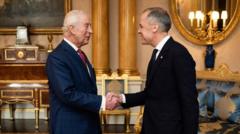The role of the British monarchy in Canadian politics has evolved considerably from the contentious times of the early 2010s when Prime Minister Stephen Harper sought to emphasize these ties, causing a national uproar that led to a pendulum shift with subsequent leaders. Under Justin Trudeau, the portrait of the Queen was replaced by local artistry, showcasing a trend towards Canadian identity. However, Carney's current invitation marks a return to welcoming royal presence, suggesting a political message aimed at affirming Canada’s uniqueness and separation from U.S. influence.
While the broader Canadian public remains divided over the monarchy — with many expressing indifference or outright criticism — this royal engagement is positioned as a strategic move by Carney to strengthen ties with both the monarchy and its traditional allies in Europe. The upcoming visit, although brief, is expected to resonate on various fronts, including diplomatic ties with Trump, and could set the tone for Canada’s international relationships in a time of shifting geopolitical dynamics.
The visit marks not only a rare occasion, with no British monarch attending the opening of Canada’s parliament since 1977, but also a moment of reflection for Canadians. As the nation's politics grapple with the lingering implications of colonial history and contemporary pressures, the presence of King Charles III serves as both a reminder of the past and a potential symbol of a collaborative future. Prime Minister Carney’s invitation thus aims to balance Canadian tradition with the present political landscape, showcasing a nuanced strategy in the face of international relations.
While the broader Canadian public remains divided over the monarchy — with many expressing indifference or outright criticism — this royal engagement is positioned as a strategic move by Carney to strengthen ties with both the monarchy and its traditional allies in Europe. The upcoming visit, although brief, is expected to resonate on various fronts, including diplomatic ties with Trump, and could set the tone for Canada’s international relationships in a time of shifting geopolitical dynamics.
The visit marks not only a rare occasion, with no British monarch attending the opening of Canada’s parliament since 1977, but also a moment of reflection for Canadians. As the nation's politics grapple with the lingering implications of colonial history and contemporary pressures, the presence of King Charles III serves as both a reminder of the past and a potential symbol of a collaborative future. Prime Minister Carney’s invitation thus aims to balance Canadian tradition with the present political landscape, showcasing a nuanced strategy in the face of international relations.




















